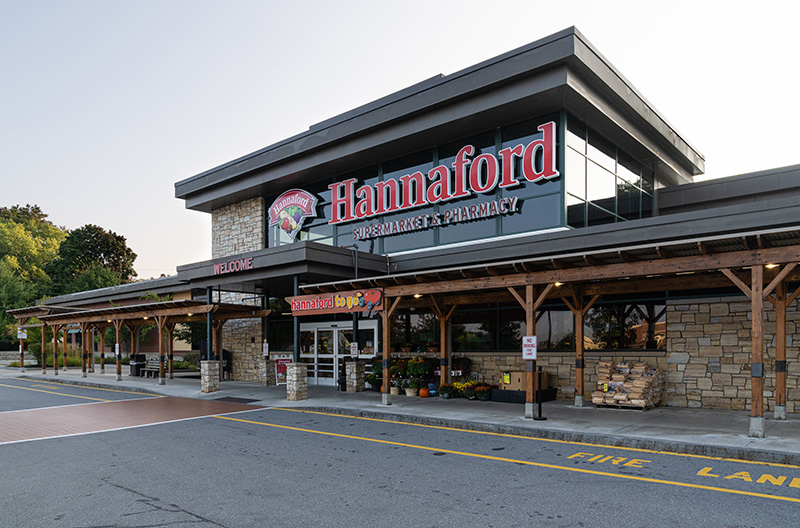Celebrating its 15th year and a recent remodel, the Hannaford store on Cony Street in Augusta, Maine, is pursuing the Living Building Challenge Core green building certification, which looks at how the building and its operations support ecology, community and energy-efficiency.
The performance-based certification is an advanced regimen of sustainability standards developed by the International Living Future Institute.
The pursuit marks the next step in the store’s progress of setting new sustainability standards for supermarkets.
The store opened in 2009 as the first supermarket in North America to achieve platinum status in the LEED for Retail rating system, having been built to the highest standards of the U.S. Green Building Council with eco-friendly, energy-saving features, systems and materials.
“This new standard elevates considerations like the store’s fit with nature; its commitment to community, inclusiveness, equity and good jobs; and it also keeps the bar high for carbon reduction, responsible water use, and responsible materials,” said George Parmenter, sustainability lead.
“[We] thank the Cony Street associates who are making this possible through their daily actions and commitment to advancing the health, wellness and sustainability of our community.”
In considering new benchmarks for the store, Hannaford partnered with the Portland, Maine, office of Thornton Tomasetti, a global engineering consulting firm with a dedicated sustainability practice, which brought forward the Living Building Challenge Core certification.
To obtain the certification, a project must meet 10 imperatives that represent best practices for sustainable buildings.
The measures include standards on responsible water use through the installation of low-flow fixtures; iceless seafood displays; and native, low-water plantings in the landscaping and on the store’s green roof.
The store also uses 70 percent less energy than a baseline building, making it the most energy-efficient store per square foot under the Hannaford banner.
The store’s remodel made locally-sourced, sustainable materials a priority, with 20 percent sourced within a 311-mile radius and 50 percent of wood incorporated into the design salvaged or certified by the Forest Stewardship Council.
Additional salvaged materials, such as refurbished refrigerators and concrete floors, were reused when possible; and 80 percent of renovation waste was diverted from landfills and recycled.
Since the certification is largely measured by daily operations, it is evaluated over a one-year period. Hannaford will learn next fall if it has met the mark for the new certification.
“The Cony Street store has always been about stretching ourselves to not only offer a convenient and enjoyable shopping experience, but to set a new standard that evolves the way retail operators and customers alike think about sustainable actions we can all take to better our environment and the community,” said Ross Mosher, director of retail capital development.
The store has served as a sustainability incubator for Hannaford, where new features and operations can be evaluated before being implemented at other locations. For example, LED lights were a new energy-saving tool when the store opened.
Now, Hannaford stores are saving 500,000 kilowatt hours with LEDs each year, enough to power 46 homes for a year.
Read more sustainability news from The Shelby Report.

